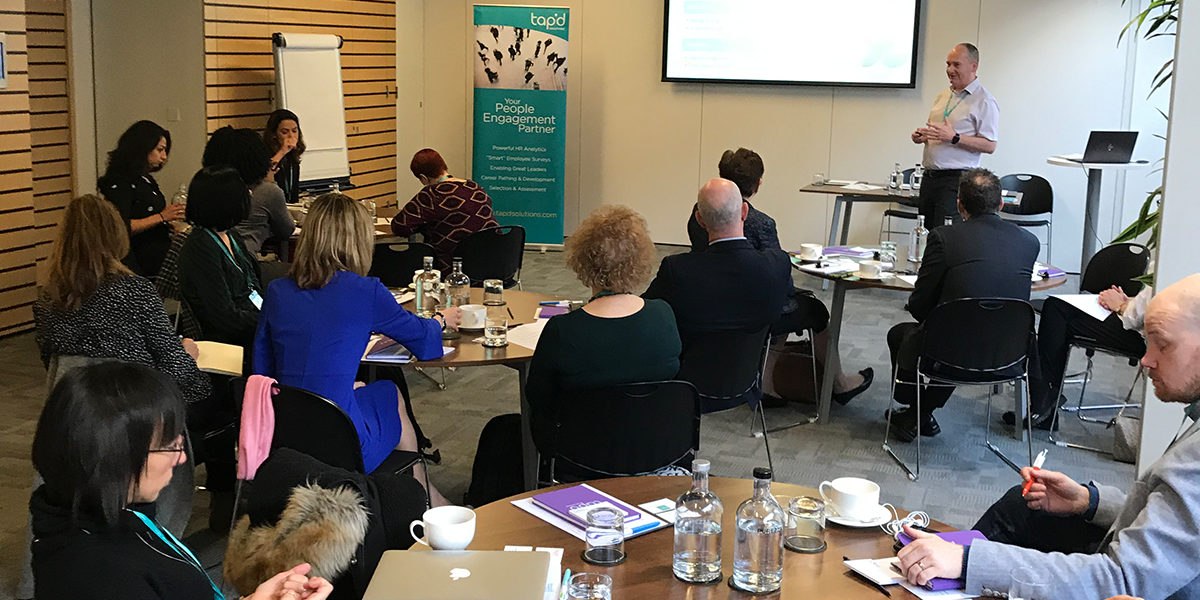The morning of Tuesday 3rd March 2020 saw the return of the Tap’d HR Forum for the 9th time. These half-day forums always bring speakers from academia and commercial organisations together with HR professionals to discuss key topics around the world of people in work. Special thanks to our thought partners, Fuel50, who once again supported the event allowing people to attend without charge.
We had some great speakers this time, including:
- Karen Notaro, Engagement and Employee Lifecycle Insight Manager, from Ministry of Justice
- Laura Pettitt, Talent & Engagement Director, at News UK
- Tatiana Rowson, Programme Director, at Henley Business School
I opened the Forum looking at the concept of people in work in the 2020s. We have long been talking about the “future of work” in 2020 at events and suddenly here we are. What can we expect to be the challenges in the coming years? First was the concept of VUCA (volatility, uncertainty, complexity and ambiguity) and how this, combined with the pace of chance, will only increase. We reflected on the global spread of the current coronavirus as something some of us might have planned for, but we didn’t see coming just over 2 months ago, that has now led to a very VUCA environment for business and our people in 2020.
I then spoke about the converging disciplines of wellbeing, engagement, inclusion and the employee experience and how our people do not see these as separate subjects, but as facets of the whole experience of work. In the coming years we need to align these activities in a more individualised and specialised way. My final observation was that the connector in all of these areas was the capability of the line manager being an adaptive leader.
Following my intro, we welcomed the first of our speakers, Karen from the Ministry of Justice. This interactive session commenced with the use of voting technology and a table quiz about the MOJ, which any behavioural scientist in the room would have observed, quickly became competitive! Karen then talked about the complexity of different departments within the MOJ. She spoke about how understanding the level of engagement in each posed challenges to the method of data gathering when technology and Wi-Fi wasn’t an option. Engagement in the MOJ is there to support and help the people where continual change in Government departments, like elsewhere, is becoming a constant. Their development of a uniform style of communication, called “One Conversation” helped to minimise rumour and support the leadership team in their message.
Following Karen was Laura from NewsUK. Laura presented an insightful view about how to bring about cultural change within one part of NewsUK through looking at the entire employee lifecycle from attraction to engagement. Laura spoke about getting the Employee Value Proposition right to attract the type of people who can support the cultural change within the organisation over time. She then showed that by creating personas of employees helped them to identify what was needed by the employees to help them be the best that they could be. She then went on to speak about the journey the people and the leadership team had gone on to look at all aspects of the employee journey, finishing on the observable value-add results around attrition, diversity, time to hire, engagement and business success stories. This was a great practical view of how a people team can work on multiple aspects of the employee experience to deliver results.
Following one of our legendary networking breaks we reconvened to hear from Tatiana from the Henley Business School. Tatiana has been conducting research on “Ageing at Work”. This insight into real research that a leading business school is working on was extremely well received. Tatiana initially defined the difference between chronological age, biological age and social age. She then spoke about what ageing at work is and isn’t. She explained that ageing, for the definition for her research, was something that we did from the moment we entered into the workforce. You could even argue that ageing at school could be included as the choices of subjects there affected your work career.
Tatiana then spoke from her research about the concept of the accumulation of resources through your career. And how by accumulating knowledge, skills and behaviours increased your resources so that later in your career you have maximised your ability to have “choices”. This interesting concept is the basis of positive mental wellbeing later in your career. To have the choice use your resources to either work less, change work to a more meaningful role, retire earlier, etc came from the hard work to gain resources in the earlier part of your career. By not working on your resources through the process of ageing at work would have the affect of limiting your choice later in life. And with possible 60-year careers now facing new entrants into the workforce, this potentially is an important issue for younger workers to consider.
After our three speakers, we opened up a conversation about how what we had heard could help us, as HR professionals, craft our strategies for the 2020s, initially on tables and then a wider group discussion.
We finished by discussing the research and white paper that Tap’d Solutions produced called the Productivity Challenge which highlights the 6 areas that HR leaders and CEOs can work on to help support their people being the most effective they can be, leading to higher productivity. A great example of this is to support internal skills development and career pathing in organisations, potentially using the Fuel50 pathing software as an enabler.
We closed with a networking lunch. Tap’d’s HR Forum returns in the Autumn. Sign up for the news at www.tapdsolutions.com/contact and keep an eye out on social media for the next forum launch.

